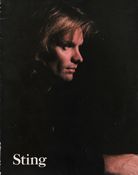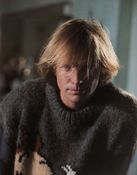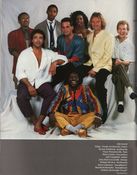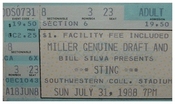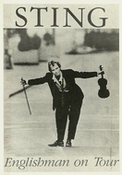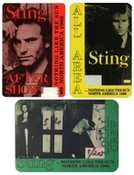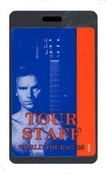
Communal glow warms Sting concert...
Sting opened last night's concert at DeVore Stadium with 'We'll Be Together'. As he sang, his voice stressing the word ''we'' until it became a triumphant declaration, spotlights flashed onto the upturned faces beneath him.
A love song was transformed in a song that described the shimmer of excitement, the intoxicating rush of communal feeling that characterizes concerts. It also described the thrust of Sting's politics. In many of his songs, Sting stresses that we include the forgotten in Chile, the tortured in South Africa, the Russians who also love their children.
The moving 'They Dance Alone' is about the women in Chile who mourn and protest the imprisonment and disappearances of their husbands, sons, brothers and fathers. They pinned pictures of their lost ones to their dresses, and they dance alone.
The song began with an ethereal, delicate guitar reminiscent of classical Spanish guitar. Set against this guitar was a low rumbling like thunder and the dried-seed rattle of maracas. As the song gathered strength, a sax began to slowly wail. While Sting sang, matches and cigarette lighters flared, and people swayed back and froth, their hands held high in an old-fashioned peace symbols, the fingers spread apart to form a V.
Another song began with the dedication ''This song is for Nelson Mandela, It is for the children in South African jails.'' Then Sting plunged in the lyrics ''Set them free'' from the song ''If You Love Someone.'' Once again, the personal metamorphosed into the political.
Behind the politics was some crisp, compelling music. The musicians playing with Sting are superb jazz artists. Sting himself began his musical career by playing jazz with the groups Phoenix and Last Exit.
This jazz sensibility gave the music wit and texture. Branford Marsalis on sax and Kenny Kirkland on keyboards were marvelous. Many of Marsalis' sax solos had a haunting, smoky flavor to them. Other times, his sax ripped through the air, yet he rarely, if ever, blurred the intricate rhythms and notes. Kirkland's playing was fluid, yet clear without murky tones.
Besides the jazz influences, Sting's music also was also shaped by Spanish and Latin American music, Brazilian and reggae. The lovely Spanish guitar that wove through the beginning of 'They Dance Alone' wove though other songs as well. Latin percussion flavored some of the songs.
But despite the varying influences, Sting's music doesn't belong in any genre. Rather, it is like a flower created though an intricate process of cross-pollination.
Even songs from his Police past like 'King of Pain' and 'Don't Stand So Close' were given new shape. 'Don't Stand' shifted from a slow, sinuous yet almost deadpan ironical version to a joyful chant. It was rather mesmerizing watching Sting vary emotion, rhythm, the shape of the song from moment to moment.
Although there is a strong jazz influence, there was little of the looseness, the extravagant and exhilarating improvisation of jazz. The music was very clean, tight and structured.
Sting also displayed his sense of humor. ''I've done Live Aid, Band Aid, Amnesty International, Save the Whales,'' He then paused and continued, ''Save the Lemmings.''
He also performed a very dry and witty 'Englishman in New York', a tribute to Quentin Crisp, a very flamboyant, witty, gay man during the '30s when it was dangerous to be flamboyant and gay.
For his encore, Sting said he had found a song that he could do for Farm Aid. The band then swayed into their version of 'Oh Give Me a Home', complete with sax. It was... interesting, which shows that anything can be saved by a good sax solo.
With its blend of politics, music and humor, last night's concert was both exhilarating and touching.
(c) San Diego Evening Tribune by Kay Sundstrom
Sting opened last night's concert at DeVore Stadium with 'We'll Be Together'. As he sang, his voice stressing the word ''we'' until it became a triumphant declaration, spotlights flashed onto the upturned faces beneath him.
A love song was transformed in a song that described the shimmer of excitement, the intoxicating rush of communal feeling that characterizes concerts. It also described the thrust of Sting's politics. In many of his songs, Sting stresses that we include the forgotten in Chile, the tortured in South Africa, the Russians who also love their children.
The moving 'They Dance Alone' is about the women in Chile who mourn and protest the imprisonment and disappearances of their husbands, sons, brothers and fathers. They pinned pictures of their lost ones to their dresses, and they dance alone.
The song began with an ethereal, delicate guitar reminiscent of classical Spanish guitar. Set against this guitar was a low rumbling like thunder and the dried-seed rattle of maracas. As the song gathered strength, a sax began to slowly wail. While Sting sang, matches and cigarette lighters flared, and people swayed back and froth, their hands held high in an old-fashioned peace symbols, the fingers spread apart to form a V.
Another song began with the dedication ''This song is for Nelson Mandela, It is for the children in South African jails.'' Then Sting plunged in the lyrics ''Set them free'' from the song ''If You Love Someone.'' Once again, the personal metamorphosed into the political.
Behind the politics was some crisp, compelling music. The musicians playing with Sting are superb jazz artists. Sting himself began his musical career by playing jazz with the groups Phoenix and Last Exit.
This jazz sensibility gave the music wit and texture. Branford Marsalis on sax and Kenny Kirkland on keyboards were marvelous. Many of Marsalis' sax solos had a haunting, smoky flavor to them. Other times, his sax ripped through the air, yet he rarely, if ever, blurred the intricate rhythms and notes. Kirkland's playing was fluid, yet clear without murky tones.
Besides the jazz influences, Sting's music also was also shaped by Spanish and Latin American music, Brazilian and reggae. The lovely Spanish guitar that wove through the beginning of 'They Dance Alone' wove though other songs as well. Latin percussion flavored some of the songs.
But despite the varying influences, Sting's music doesn't belong in any genre. Rather, it is like a flower created though an intricate process of cross-pollination.
Even songs from his Police past like 'King of Pain' and 'Don't Stand So Close' were given new shape. 'Don't Stand' shifted from a slow, sinuous yet almost deadpan ironical version to a joyful chant. It was rather mesmerizing watching Sting vary emotion, rhythm, the shape of the song from moment to moment.
Although there is a strong jazz influence, there was little of the looseness, the extravagant and exhilarating improvisation of jazz. The music was very clean, tight and structured.
Sting also displayed his sense of humor. ''I've done Live Aid, Band Aid, Amnesty International, Save the Whales,'' He then paused and continued, ''Save the Lemmings.''
He also performed a very dry and witty 'Englishman in New York', a tribute to Quentin Crisp, a very flamboyant, witty, gay man during the '30s when it was dangerous to be flamboyant and gay.
For his encore, Sting said he had found a song that he could do for Farm Aid. The band then swayed into their version of 'Oh Give Me a Home', complete with sax. It was... interesting, which shows that anything can be saved by a good sax solo.
With its blend of politics, music and humor, last night's concert was both exhilarating and touching.
(c) San Diego Evening Tribune by Kay Sundstrom


